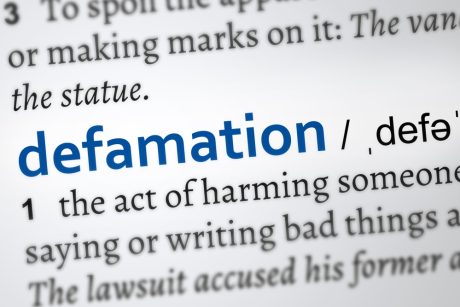Determining the meanings of words in defamation cases
What a hypothetical reasonable reader would have understood an allegedly defamatory statement to mean is of fundamental importance to a defamation case in England and Wales, and in much of the rest of the world. Often a defence will stand or fall on the meaning attributed to the publication by the court.
For example, the publisher of a defamatory item may be able to prove that one meaning is substantially true but not be able to prove the truth of a more seriously defamatory meaning. We look at what has changed over the past couple of years, and where we may be heading.
As well as other criteria, to succeed in a claim for defamation a claimant must show that the statement about which they complain has a defamatory meaning. Proving this has historically involved two steps:
- establishing what the ordinary reasonable reader would have understood the statement (eg a social media post or a press publication) to mean, and,
- proving that the meaning of the statement is defamatory. A statement is generally defamatory if it tends to lower the claimant in the estimation of right-thinking members of society generally. Also, under the Defamation Act 2013 its publication must have caused or be likely to cause serious harm to the reputation of the claimant.
It is critical to determine the meaning conveyed by the statement complained of in order to discern the position on serious harm or otherwise, and to determine what arguments and what evidence the defendant needs to be able to put forward to defend the claim.
Early determination before the defence?
In the past, the meanings of statements were often decided by juries at trials. Since the introduction of section 11 of the Defamation Act 2013, which dictates that defamation trials are to be without juries unless the court orders otherwise, jury trials in defamation cases have largely been consigned to the history books. The move to judge-only trials has seen a frequent number of meaning and serious harm determinations at an early stage of legal proceedings. This has radically changed how the courts have started handling defamation actions over the last couple of years.
As stated by Mr Justice Nicklin in Morgan v. Associated Newspapers Ltd [2018] EWHC 1850 (QB): “One of the great advantages of the removal of trial by jury in defamation cases is the opportunity it presents for greater case management of defamation claims. Previously, disputed issues of fact… had to be left to trial to be determined by the jury. Unless the parties agreed, that effectively prevented the court ruling on the actual meaning of the words complained of. In consequence, it was quite common to have defamation actions where the parties advanced rival contentions as to the actual meaning of the words. Defences were pleaded upon the defendant’s contention as to what the words might be found to mean. That could potentially be hugely wasteful of costs. If the defendant sought to defend meaning X as true, but the jury found it meant Y and that the defendant’s defence of truth in consequence failed, litigation of whether X was true is rendered largely (if not completely) pointless… Now, the natural and ordinary meaning of the words complained of in a defamation claim can be determined, in most cases, as soon as the Particulars of Claim have been served. No evidence, beyond the words complained of is admissible, so the hearing can be accommodated, as this one was, in a couple of hours. It is potentially hugely wasteful of costs for a defendant to plead a full defence if meaning is in dispute. Following the court’s ruling on meaning, the defence may no longer be viable, or it may require amendment in light of the court’s ruling.”
Most cases now settle out-of-court fairly quickly after a determination of meaning that is favourable to one of the parties, because the position of each party’s respective case is so much clearer.
Mr Justice Nicklin went further in a judgment released a month later in 2018 (Bokova v. Associated Newspapers Ltd [2018] EWHC 2032 (QB)), where he referred to “a culture shift in defamation pleadings” and a “new era where meaning will regularly be tried as a preliminary issue”.
He added: “The benefits are obvious. Indeed, if there is no factual dispute on the issue of publication (eg a dispute over the actual words published, reference or innuendo), I struggle to see circumstances in which the parties would want to proceed through the stages of defamation litigation without having meaning determined. Its determination can lead to the parties resolving the dispute without the need for further litigation. Even if the claim cannot be settled at that stage, there remain significant benefits for the future conduct of the case. A defendant would know, for example, what would be required for any truth defence to have a real prospect of success. Equally, if meaning is determined before a Defence is served, it remains open to a defendant to make an offer of amends under s.2 Defamation Act 1996 (an opportunity that is lost ‘after serving a defence’ (s.2(5)). But most importantly, it avoids the spectre of hugely wasteful litigation (perhaps requiring up to a year’s preparation and several weeks of trial) of a meaning that the words are found not actually to bear.”
In a judgment in February this year (Poroshenko v BBC [2019] EWHC 213 (QB)), Mr Justice Nicklin criticised the claimant (and his solicitors) for unreasonably delaying their agreement to the BBC’s suggestion of meaning being determined as a preliminary issue and before the service of the defence. In the end, the claimant agreed to the procedure, but was ordered to pay the BBC’s legal costs because of the failure to do so earlier, which was a “wasteful and obstructive stance”. He added: “Agreement to the trial of meaning as a preliminary issue should have been provided swiftly after the BBC’s proposal… once it is clear that meaning is in dispute, the issue should be considered by all parties, and a burden will normally fall on any party who contends that the issue should not be resolved by determination at a preliminary issue trial to present cogent and case-specific reasons why not. The disadvantages of ploughing on, not only to the parties in terms of potentially wasted costs, but also in disproportionate drains on the resources of the court mean that that burden may be difficult to discharge.”
What is the impact on new cases?
Following these and other judgments, it is clear that where the meaning of a publication is in dispute, it should generally be determined as early as possible and in many cases before service of the defence. This allows defendants to save the costs of preparing a defence and potentially amending it after the determination of meaning.
Defamation litigation has consistently been criticised for generating very high levels of legal costs. Parliament and judges are aware of this and have made various efforts to control the costs of such litigation. Providing opportunities to resolve disputes over meaning early should both reduce costs and speed up the resolution of disputes. Claimants should receive vindication and damages quicker, and defendants should be able to control the costs of litigation better and dispose of weak claims more quickly.
Defamatory meanings to be determined on the papers?
Most contested meaning applications in defamation cases are decided at a hearing, but it is possible for the court to decide them as a paper exercise, and Mr Justice Nicklin seems willing to progress defamatory meaning applications down this route. For instance, he said in his judgment for Hewson v Times Newspapers Ltd & anor [2019] EWHC 650 (QB) in March 2019: “At least in theory, there is no practical reason why the natural and ordinary meaning of a publication cannot be determined by the court, without a hearing, based on the parties’ written submissions.”
Mr Justice Nicklin noted that the Hewson case was the first time that such an application had been dealt with on the papers, but that with the appropriate procedure in place such applications could be an effective way of reducing costs and speeding up litigation.
In the Hewson case, both parties had consented to meaning being determined without a hearing and based upon written submissions, but such consent is not strictly necessary, and Mr Justice Nicklin said in his judgment: “The procedure has been adopted by consent. It leaves open for consideration on another occasion whether, if the parties do not consent, the court could nevertheless direct, in an appropriate case, that a preliminary issue on meaning should be determined, without a hearing, on the basis of written submissions.”
The logic of potentially dealing with defamatory meaning applications as a paper exercise by the judge was made clear in a decision of the Court of Appeal handed down on 15 May 2019. In Tinkler v. Ferguson & Others [2019] EWCA Civ 819, the Court of Appeal endorsed a statement by Mr Justice Nicklin at first instance in which he said: “As I always do before being asked to determine meaning as a preliminary issue, I read the words complained of without reference to the parties’ contentions as to meaning or their detailed submissions. In that way, I can capture my initial reaction as a reader, unaffected by these extraneous and irrelevant considerations.” In the Court of Appeal, Lord Justice Longmore said that this was “the correct approach”. Lord Justice Bean took the slightly unusual step of giving a separate concurring judgment in which he stressed his agreement with Mr Justice Nicklin’s approach: “Like Mr Justice Nicklin, on receipt of the papers in a defamation case about meaning my practice is to read the words complained of before anything else, as an ordinary reader of the publication would do.”
Given the current focus of judges on their first impression of how a hypothetical reasonable reader would have interpreted a publication, parties face an uphill battle to pursue unlikely meanings. In the near future, the value of having an oral hearing on meaning may be deemed to lie only in cases where the context or other circumstances are such that written submissions are inadequate or inappropriate, such as where one or more of the parties is not legally represented. In more straightforward cases, the benefits in terms of costs and time of determining meaning as a paper exercise may well outweigh any downsides.
Conclusion
The courts are keen on making defamation litigation quicker, cheaper, and fairer. This is an area of law that has been prohibitively expensive for many, and is associated with claims being issued by the rich rather than ordinary individuals. All of this may be set to change in an era where defamatory meanings are being decided on a preliminary and cost effective basis. Time will tell, but it could lead to an increase in the amount of issued defamation court claims which are then dealt with in preliminary trials on meaning, or even as paper exercises. This seems to be a pattern that is already gaining momentum in the first half of 2019.
Subscribe – In order to receive our news straight to your inbox, subscribe here. Our newsletters are sent no more than once a month.






